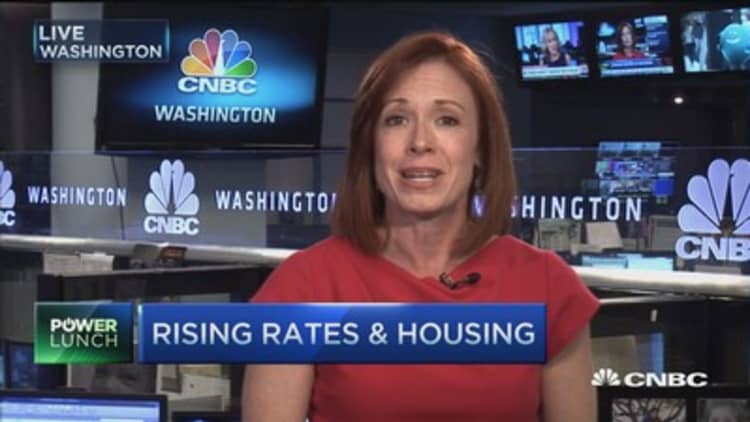
Is it too late to refinance your mortgage? That depends on your motivation.
Rising rates have put a dent in mortgage applications and refinance activity. The Mortgage Bankers Association reported earlier this week that mortgage applications during the last week of May decreased 7.6 percent from a week earlier. Refinances dropped from 51 percent to 49 percent of mortgage activity—the lowest level since May 2014.
For the week ended June 2, rates for a 30-year, fixed-rate mortgage averaged 4.06 percent, up from 4.02 percent the previous week, according to mortgage information site HSH.com. "The 4 percent threshold is a key threshold," said Greg McBride, chief financial analyst at Bankrate.com. "That may have taken the money off the table." Plenty of homeowners already have rates in the neighborhood of 4.25 to 4.5 percent, he said, so refinancing savings aren't compelling.
Read MoreRising interest rates: What it means for you
In February, when rates were closer to 3.75 percent, there were roughly 7.1 million homeowners in 30-year, fixed-rate mortgages that could have benefited from refinancing, according to an April report from Black Knight Financial Services, a mortgage analytics firm. Rates rising just half a percentage point would mean 3 million of those borrowers would no longer benefit, it estimated.
Nor are homeowners likely to see better deals if they wait. "It's too late to refinance if you want the absolute rock-bottom interest rates," said Keith Gumbinger, vice president at HSH.com.
Volatility is likely to continue in coming months, he said, as the market reacts to any indications of the Federal Reserve raising the federal funds rate (or holding off on doing so). Rates may drop again slightly, but they are more likely to firm up as a move becomes more certain.
Read MoreWhat do we know about credit scores? Less than we think
That said, there may still be some homeowners who would benefit from refinancing—or at least, crunching the numbers. It's not always a rate-based decision. Moving into a shorter-term loan could help a homeowner pay off his mortgage faster, for example, while a new long-term loan could improve cash flow, Gumbinger said.
Other consumers may find themselves better able to refinance now, where they couldn't before due to low equity or a bad credit score. "Whether or not you should refinance is a very individualized [question]," he said.
Consumers who have an adjustable-rate mortgage in particular may want to take a look at their options, said McBride. Those loans offer a fixed rate for a set period—usually five, seven or 10 years—and then adjust annually. "The situation you want to avoid is being a sitting duck for upward rate resets in future years," he said. Refinancing could make sense if you're likely to still be in the home when the next reset happens on your current mortgage, depending on the rate you're paying and the Fed's moves.
Read MoreBiggest millennial home-buying mistakes
"You have to pay attention," he said. ""Evaluate the sensitivity of your household budget to that."


